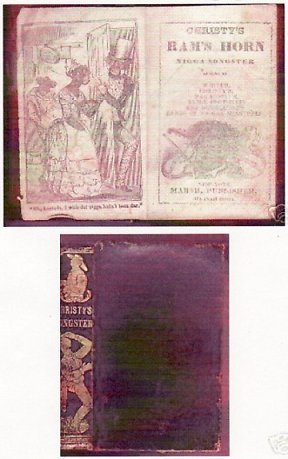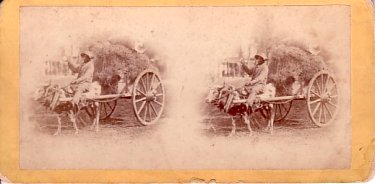

|
<<< Continued from previous page Many believe that minstrelsy had its roots in the circus. This broadside, with its prominent headline of "Two Clowns!" appears to support that theory. The broadside also advertises an upcoming stage performance of Uncle Tom's Cabin.

While such artifacts of early African American history are not extremely common, neither are they impossible to find. Although the blackface performers were not black men themselves, the broadside represents a disturbing but historically accurate reflection of the perception of African Americans in the mid-1800s in American popular culture, prior to the Civil War and pre-dating the abolition of slavery. The historic minstrelsy broadside sold on eBay for $299.99. Another artifact of Civil War African-Americana which surfaces with some regularity is the 19th century minstrelsy book. The first book I found in this genre was an 1855 title, Charley White's Ethiopian Joke Book, authored by Charles White. The title page describes it as "the first and only work of the kind ever published, containing a full expose of all the most Laughable Jokes, Stories, Witticisms, &c. &c. as told by this Great Ethiopian Comedian at White's Opera House, New York, the first and oldest established place of Minstrelsy in America." The small booklet in paper wraps was found in an antiques mall with its back cover not only detached but missing. Nevertheless, it sold on eBay to a collector of early minstrelsy materials for $232.49. A couple of years later, at another antiques mall, I uncovered a circa 1850 book titled Christy's Ram's Horn Nigga Songster: As Sung by White's, Christy's, Harmonist's, Sable Brothers' and Dumbleton's Bands of Nigger Minstrels. It was a compilation of song lyrics performed at minstrel shows in the mid-19th century.

E.P. Christy was an early blackface performer who formed his first minstrel troupe in Buffalo, New York in 1842. By 1846, Christy's Minstrels moved into Mechanic's Hall in New York, a venue they would occupy for 10 years. Christy favored sentimental plantation ballads and helped to popularize several songs written by Stephen Foster. The Christy Minstrels performed Foster's "Oh! Susanna" in 1848 and turned it into a national hit. The downside was that the song was widely pirated by sheet music publishers, who earned thousands of dollars from the song's sales, while depriving Stephen Foster of his royalties. In 1851, Foster sold Christy the right to authorship of his composition, "Old Folks at Home," better known as "Swanee River." It was a move he would live to regret. That early minstrelsy book likewise yielded a nice profit on eBay, selling for $207.50. The common element uniting these various African American collectibles of the Civil War and antebellum era is their documentation of a history that, while not forgotten, is sometimes ignored. The search for roots in both an individual and collective American past propels these artifacts to values that often seem to exceed comparable collectibles without the race factor. What exactly is the race factor? While some might question the ethics of profiting from items whose very desirability stems from their status as racist objects, collectors cite the historic value of African American memorabilia. Such objects preserve a record of the racist attitudes held by society in times past and act as a safeguard against the perpetuation of the negative stereotypes reflected in the artifacts. When buying historic African Americana for resale, it is important to have a basic understanding of the chronological timeline of African Americans from their pre-Civil War status as an enslaved people to freed men and women following the close of the Civil War: 1850 - The Fugitive Slave Law is passed, requiring all citizens to return runaway slaves to their owners. 1856 - The Dred Scott decision legalizes slavery in the territories. 1862 - The Emancipation Proclamation abolishes slavery in rebel territory. 1865 - The 13th Amendment abolishes slavery. 1868 - The 14th Amendment makes citizens of the formerly enslaved. 1870 - The 15th Amendment guarantees voting rights for the formerly enslaved. 15th Amendment: "The right of citizens of the United States to vote shall not be denied or abridged by the United States or by any State on account of race, color, or previous condition of servitude." Although the 15th Amendment was passed in 1870 guaranteeing voting rights for all African Americans, the rocky path from slavery to full racial equality would continue to define the history of America into the present day. An historic ethnic stereoview by photographer J.N. Wilson of Savannah, Georgia depicts an African American riding an ox while pulling a wagon load of crops. It is titled on the reverse with the derogatory slogan, "15th Amendment bringing his Crop to Town."

In his excellent reference book on historic photographs of black Americans, Introduction to African American Photographs 1840-1950: Identification, Research, Care and Collecting, Ross J. Kelbaugh explains, "In recent years the vintage photographs of African Americans have received greater attention by historians, collectors, institutions and, most importantly, African Americans themselves ... I began collecting African American photographs back in the early 1970s as I sought out 19th century and early 20th century American images at antique shows, flea markets, antique shops, auctions and vintage photography shows. Now competition among individual collectors and cultural institutions vying to make their collections more inclusive has caused rapidly escalating prices and new interest in preserving what was largely forgotten not so long ago."
< to previous article to next article >
Questions or comments?
| Forum
| Store
| Publications
| BookLinks
| BookSearch
| BookTopics
| Archives
| Advertise
| AboutUs
| ContactUs
| Search Site
| Site Map
| Google Site Map
Store - Specials
| BookHunt
| BookShelf
| Gold Edition & BookThink's Quarterly Market Report
| DomainsForSale
| BookThinker newsletter - free
Copyright 2003-2011 by BookThink LLC
|

|
|